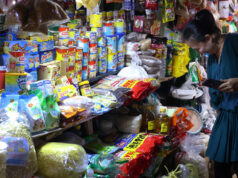JG Summit to ramp up capital spending this year
By Arra B. Francia, Reporter
JG SUMMIT Holdings, Inc. is hiking its capital spending for 2018 as it aims to grow its petrochemical, airline, property, food and beverage, and banking businesses amid higher oil prices in the world market and the further depreciation of the peso.
The Gokongwei-led conglomerate said on Monday that it will be spending around P80 billion in capital expenditures this year. This is around 83% higher than the P43.5 billion it spent in 2017.
Bulk of the 2018 capex will go to Robinsons Land Corp. at P30 billion. JG Summit Petrochemical Corp. will corner P20 billion, while Cebu Air, Inc. will get “a little over P20 billion,” according to JG Summit President and CEO Lance Y. Gokongwei during their annual shareholders’ meeting in Pasig City late Monday.
The food and beverage business through Universal Robina Corp. (URC) will be spending P7 billion, while the balance will go to JG Summit’s smaller units.
Mr. Gokongwei said the company has already spent P11 billion out of the capex for the first quarter of 2018.
Moving forward, the company said it remains optimistic for growth prospects, amid various factors that are expected to affect its business units. This includes the implementation of the tax reform program that will hit products by URC, fuel surcharge rates weighing on Cebu Air’s operations, and the overall weakening of the peso.
AIRFARES TO GO UP
Mr. Gokongwei said its budget carrier Cebu Pacific is seeking to impose a fuel surcharge of between P70 to P250 for domestic flights, in order to offset the higher cost of oil in the world market alongside the weaker peso. An application for the fuel surcharge has been submitted to the Civil Aeronautics Board.
“The effect of the fuel price and currency has been quite significant for us. The effect of fuel, approximately P20 million per month for every dollar increase in fuel and the effect of currency is about P65 million per month for the higher cost of, because of the weaker peso,” Mr. Gokongwei told reporters on the sidelines of the shareholders’ meeting.
“In aggregate, it is costing us P700 million more per month to fly the same net worth,” the Cebu Air president and CEO said.
During the first quarter, Cebu Air reported earnings rose 12% to P1.43 billion. However, operating expenses also jumped 12% to P15.997 billion due to higher fuel prices, weak Philippine peso and the airline’s purchase of new aircraft. It also reported net foreign exchange losses of P838.619 million for the three months, as the Philippine peso averaged P52.16 per US dollar for the three months ended March 31, from P49.93 per US dollar for the 12 months ended Dec. 31, 2017.
Cebu Pacific also expects its top-line to be affected by the six-month closure of Boracay island that started in April, as Cebu Pacific’s flights to and from Caticlan Airport account for 6-7% of its total flights.
“We anticipate maybe P500 million to P1 billion (in foregone revenues) during that because it takes time to transfer that to other destinations… But this is still a strong positive for the country after rehabilitation is complete” Mr. Gokongwei said.
HIGHER PRICES LOOM
Under URC, Mr. Gokongwei said the company has increased prices of some beverages due to the P6-per-liter increase in taxes for sugar-sweetened beverages under the Tax Reform for Acceleration and Inclusion law. URC has already increased prices of its C2 tea brand by 22-23%, which has led to a 12-15% drop in volumes during the first quarter of 2018.
“We begin to raise prices in May. We will raise most of our snack prices in May and subsequently in June, snack and noodles,” Mr. Gokongwei said. Among URC’s snack brands include Chippy, Piattos, and Nova, while its noodle brands include Payless Instant Mami and Nissin Yakisoba.
To offset the effects of higher taxes and stiffer competition, Mr. Gokongwei said they will be introducing more products into its portfolio.
“We’re doing some research now… Review all options, renovating existing brands and launching incremental new products,” he said.
Mr. Gokongwei, who is also chairman of URC, said the company hopes to see year-on-year growth in earnings by the third quarter.
BANK RECAPITALIZATION
JG Summit is likewise planning the recapitalization of Robinsons Bank, as it looks to pour in around P4.3 billion to further expand its operations to 100 branches. Mr. Gokongwei noted that the Bangko Sentral ng Pilipinas (BSP) requires banks to have a capital base of at least P15 billion to operate 100 locations.
At the end of 2017, Robinsons Bank’s capital stood at P12.11 billion, according to BSP data.
“In July, we’re going to add further P4.3 billion for the bank’s capital. RRHI (Robinsons Retail Holdings, Inc.) will fund P1.2 billion, JG Summit will fund P1.8 billion and this will further support our growth, lending growth as well as in our net worth,” Mr. Gokongwei said.
For JG Summit’s petrochemical business, Mr. Gokongwei said they are continuing the $1-billion expansion of its naphtha cracker facility that will increase production to 480,000 tons from 320,000 tons. The facility is expected to be completed by 2020.
JG Summit’s net income attributable to the parent dropped by 35% in the first quarter of 2018 to P4.82 billion, amid a 4.7% increase in revenues to P70.68 billion.
Shares in JG Summit gained 25 centavos or 0.43% to close at P59 each at the stock exchange on Tuesday.



